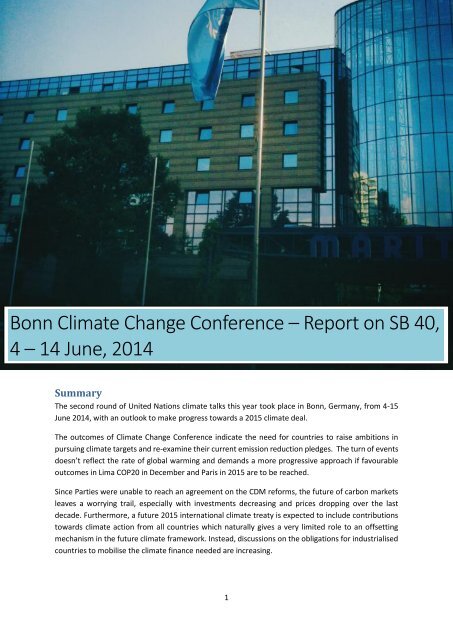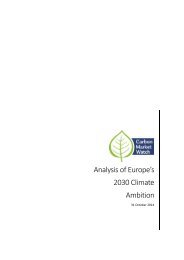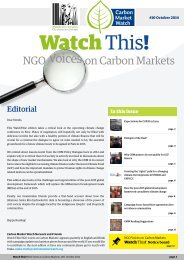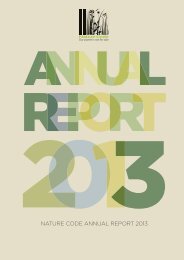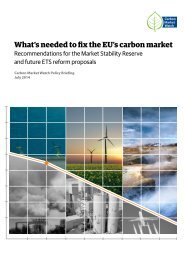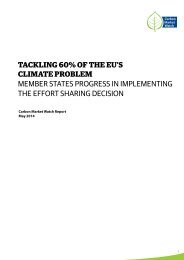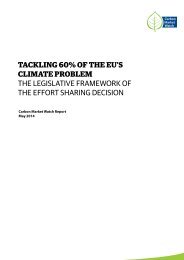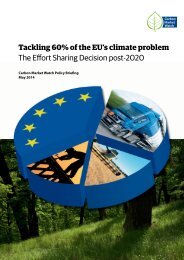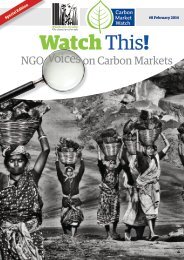Bonn Climate Change Conference – Report on SB 40, 4 – 14 June, 2014
Create successful ePaper yourself
Turn your PDF publications into a flip-book with our unique Google optimized e-Paper software.
<str<strong>on</strong>g>B<strong>on</strong>n</str<strong>on</strong>g> <str<strong>on</strong>g>Climate</str<strong>on</strong>g> <str<strong>on</strong>g>Change</str<strong>on</strong>g> <str<strong>on</strong>g>C<strong>on</strong>ference</str<strong>on</strong>g> <str<strong>on</strong>g>–</str<strong>on</strong>g> <str<strong>on</strong>g>Report</str<strong>on</strong>g> <strong>on</strong> <strong>SB</strong> <strong>40</strong>,<br />
4 <str<strong>on</strong>g>–</str<strong>on</strong>g> <strong>14</strong> <strong>June</strong>, 20<strong>14</strong><br />
Summary<br />
The sec<strong>on</strong>d round of United Nati<strong>on</strong>s climate talks this year took place in <str<strong>on</strong>g>B<strong>on</strong>n</str<strong>on</strong>g>, Germany, from 4-15<br />
<strong>June</strong> 20<strong>14</strong>, with an outlook to make progress towards a 2015 climate deal.<br />
The outcomes of <str<strong>on</strong>g>Climate</str<strong>on</strong>g> <str<strong>on</strong>g>Change</str<strong>on</strong>g> <str<strong>on</strong>g>C<strong>on</strong>ference</str<strong>on</strong>g> indicate the need for countries to raise ambiti<strong>on</strong>s in<br />
pursuing climate targets and re-examine their current emissi<strong>on</strong> reducti<strong>on</strong> pledges. The turn of events<br />
doesn’t reflect the rate of global warming and demands a more progressive approach if favourable<br />
outcomes in Lima COP20 in December and Paris in 2015 are to be reached.<br />
Since Parties were unable to reach an agreement <strong>on</strong> the CDM reforms, the future of carb<strong>on</strong> markets<br />
leaves a worrying trail, especially with investments decreasing and prices dropping over the last<br />
decade. Furthermore, a future 2015 internati<strong>on</strong>al climate treaty is expected to include c<strong>on</strong>tributi<strong>on</strong>s<br />
towards climate acti<strong>on</strong> from all countries which naturally gives a very limited role to an offsetting<br />
mechanism in the future climate framework. Instead, discussi<strong>on</strong>s <strong>on</strong> the obligati<strong>on</strong>s for industrialised<br />
countries to mobilise the climate finance needed are increasing.<br />
1
During the two weeks a slow headway towards the new climate deal was made, al<strong>on</strong>g with a notable<br />
breakthrough of 60 nati<strong>on</strong>s agreeing to phase out dirty fossil fuels and replace them with 100%<br />
renewable energy sources by the middle of this century. <str<strong>on</strong>g>B<strong>on</strong>n</str<strong>on</strong>g> c<strong>on</strong>ference was recognized overall as a<br />
small step forward in determining elements of a draft treaty, aimed at being delivered in Lima COP 20<br />
by the end of the year. Discussi<strong>on</strong>s <strong>on</strong> many items came to a halt and are to be c<strong>on</strong>sidered further in<br />
Peru. The <str<strong>on</strong>g>B<strong>on</strong>n</str<strong>on</strong>g> climate talks also fell short of determining how the numerous regi<strong>on</strong>al and nati<strong>on</strong>al<br />
carb<strong>on</strong> trading schemes are to fit into a future internati<strong>on</strong>al framework. A growing understanding<br />
exists that Paris needs to be a turning point where binding decisi<strong>on</strong>s are to be made to reach low<br />
carb<strong>on</strong> world. Much needs to be d<strong>on</strong>e in the coming m<strong>on</strong>ths and negotiators hope to take discussi<strong>on</strong>s<br />
further in meetings planned in <str<strong>on</strong>g>B<strong>on</strong>n</str<strong>on</strong>g> for October and beforehand in a climate summit in September<br />
called by UN Secretary General Ban Ki-mo<strong>on</strong> in New York.<br />
Below is a more detailed summary of the respective discussi<strong>on</strong>s:<br />
Reforms <strong>on</strong> the Kyoto Protocol Mechanisms postp<strong>on</strong>ed<br />
Key negotiati<strong>on</strong>s were evolving around the Kyoto Protocol’s project-based mechanisms Clean<br />
Development Mechanism (CDM) and Joint Implementati<strong>on</strong> (JI). Major reforms <strong>on</strong> the rules of these<br />
two were however postp<strong>on</strong>ed.<br />
<strong>SB</strong>I c<strong>on</strong>tinued its c<strong>on</strong>siderati<strong>on</strong> of the possible changes<br />
to the modalities and procedures for the Clean<br />
Development Mechanism (CDM) (issue<br />
FCCC/TP/20<strong>14</strong>/1). It was a mutual understanding am<strong>on</strong>g<br />
many Parties that CDM is an important instrument in<br />
many developing countries and should be evolved and<br />
reformed further in a way to generate substantial emissi<strong>on</strong>s reducti<strong>on</strong>s for the benefit of the<br />
atmosphere. The participants discussed the informal note prepared by the co-chairs in Warsaw taking<br />
into account the technical paper. Technical paper included some of the key elements, including;<br />
protecting against c<strong>on</strong>flict of interest; improving gender balance; Inclusi<strong>on</strong> of [requirements]<br />
[principles] [means] for the dem<strong>on</strong>strati<strong>on</strong> of additi<strong>on</strong>ality; clarifying the roles of designated nati<strong>on</strong>al<br />
authorities; etc.<br />
During negotiati<strong>on</strong>s, parties disagreed <strong>on</strong>, inter alia, the need for a technical paper focusing <strong>on</strong> net<br />
mitigati<strong>on</strong>, and the CDM Executive Board to identify opti<strong>on</strong>s for the evoluti<strong>on</strong> of the CDM to generate<br />
substantial net emissi<strong>on</strong> reducti<strong>on</strong>s. No c<strong>on</strong>clusi<strong>on</strong> was reached by the countries in this matter, thus<br />
discussi<strong>on</strong> is deferred until the next sessi<strong>on</strong> at <strong>SB</strong>I 41. A new Co-Chairs note was issued, which reflects<br />
areas that Parties would like to further c<strong>on</strong>sider in Lima. Issues the Parties have agreed to, will included<br />
in the review.<br />
To see a revised versi<strong>on</strong> of possible changes to the modalities and procedures for the CDM prepared<br />
at <strong>SB</strong>I 39, with a list of possible changes for further c<strong>on</strong>siderati<strong>on</strong> at <strong>SB</strong>I 41 as well as those that have<br />
been agreed at <strong>SB</strong>I <strong>40</strong>, click here.<br />
2
On the basis of the draft text introduced at <strong>SB</strong>I 39, <strong>SB</strong>I <strong>40</strong> also c<strong>on</strong>tinued the review of the Joint<br />
Implementati<strong>on</strong> Guidelines. Similar to the reform of the CDM, countries could not agree <strong>on</strong> the details.<br />
Parties engaged in discussi<strong>on</strong>s worked <strong>on</strong> a draft decisi<strong>on</strong> al<strong>on</strong>g with an annex <strong>on</strong> modalities and<br />
procedures for JI, including secti<strong>on</strong>s <strong>on</strong> the JI Supervisory Committee, host countries, eligibility to<br />
transfer and acquire credits, and project cycle. Ultimately, <strong>SB</strong>I decided to c<strong>on</strong>tinue discussi<strong>on</strong> at <strong>SB</strong>I<br />
41 <strong>on</strong> the basis of the draft decisi<strong>on</strong> text proposed by the co-chairs of the informal c<strong>on</strong>sultati<strong>on</strong>s<br />
(FCCC/<strong>SB</strong>I/2013/L.11).<br />
The draft decisi<strong>on</strong> text (Draft decisi<strong>on</strong> -/CMP.10, paragraphs 8 and 9) still stipulates that all registered<br />
JI projects will be able to carry <strong>on</strong> operati<strong>on</strong> without the need to be reregistered or changed in any<br />
way and will do so under old JI guidelines. That means that any improvements made with new JI M&P<br />
in terms of envir<strong>on</strong>mental integrity w<strong>on</strong>’t affect already registered projects and they will be able to<br />
c<strong>on</strong>tinue with ERU generati<strong>on</strong>.<br />
Progress was however made with regards to setting baseline, that is, by approving the bracketed text<br />
in Annex to the Draft Decisi<strong>on</strong> - Paragraph 6 (b) (ii) a) <str<strong>on</strong>g>–</str<strong>on</strong>g> determining that baseline has to be “lower<br />
than the relevant current emissi<strong>on</strong> levels”.<br />
Slow progress <strong>on</strong> market and n<strong>on</strong>-market based mechanisms<br />
Up to date there is no single soluti<strong>on</strong> <strong>on</strong> how to provide a framework for the many domestic mitigati<strong>on</strong><br />
acti<strong>on</strong>s that are emerging around the world. At <strong>SB</strong> <strong>40</strong> Parties came together to discuss comp<strong>on</strong>ents<br />
and rules around the Framework for Various Approaches (FVA) (FCCC/<strong>SB</strong>STA/20<strong>14</strong>/L.10). FVA aims<br />
to ensure that all approaches used for emissi<strong>on</strong> mitigati<strong>on</strong> meet certain standards and can be used<br />
for compliance with internati<strong>on</strong>al obligati<strong>on</strong>s.<br />
Following a collapse of negotiati<strong>on</strong>s at <strong>SB</strong>STA 39 in Warsaw in November 2013 Parties tried to<br />
elaborate comm<strong>on</strong> rules for all mitigati<strong>on</strong> efforts, market and n<strong>on</strong>-market based at <strong>SB</strong>STA <strong>40</strong>. During<br />
the discussi<strong>on</strong>s developing countries stressed that agreeing <strong>on</strong> the design of the FVA is a prec<strong>on</strong>diti<strong>on</strong><br />
to start a discussi<strong>on</strong> <strong>on</strong> the mechanisms. Within FVA, it was also discussed whether REDD+ will become<br />
a new market mechanism. Brazil, China and the European Uni<strong>on</strong> were opposing REDD+ becoming a<br />
market mechanism with other Parties appearing to be in favour.<br />
The Parties expressed their tendency towards sharing informati<strong>on</strong> and good practice <strong>on</strong> design and<br />
operati<strong>on</strong> of both, market- and n<strong>on</strong>-market-based approaches, in the design of the framework.<br />
Corresp<strong>on</strong>dingly, countries and observer organizati<strong>on</strong>s were invited to<br />
submit their views to the secretariat, by 22 September 20<strong>14</strong>, addressing<br />
whether and how approaches meet standards comparable to UNFCCC<br />
standards, how they are to enable accounting, allow participati<strong>on</strong>,<br />
provide co-benefits, instituti<strong>on</strong>al arrangements and governance, and<br />
relate to internati<strong>on</strong>al agreements. By December 20<strong>14</strong>, when <strong>SB</strong>STA 41<br />
in Lima takes place, secretariat is to provide a technical paper based <strong>on</strong><br />
submissi<strong>on</strong>s <strong>on</strong> how approaches may address these issues. In the final<br />
versi<strong>on</strong> of draft c<strong>on</strong>clusi<strong>on</strong>, the annexes have been deleted as well as references to what many Parties<br />
referred to as ‘undefined terminology’, such as net emissi<strong>on</strong> reducti<strong>on</strong>s.<br />
3
With regard to new market-based mechanism (NMM) (FCCC/<strong>SB</strong>STA/20<strong>14</strong>/L.12), defined at COP17<br />
and devised to promote and enhance the cost-effectiveness of mitigati<strong>on</strong> acti<strong>on</strong>s, <strong>SB</strong>STA in its last<br />
sessi<strong>on</strong> c<strong>on</strong>tinued its work programme to elaborate correlated modalities and procedures. The<br />
subsidiary body invited Parties to c<strong>on</strong>sider and provide submissi<strong>on</strong> <strong>on</strong> the following issues: design and<br />
governance of NMM, elements of its modalities and procedures, the meaning of “a net decrease<br />
and/or avoidance of global greenhouse gas emissi<strong>on</strong>s,” less<strong>on</strong>s learned from relevant Kyoto Protocol<br />
mechanisms, NMM’ relati<strong>on</strong>ship with FVA and its and relati<strong>on</strong>ship with enhanced mitigati<strong>on</strong> ambiti<strong>on</strong>.<br />
Furthermore, Parties were invited to submit their views <strong>on</strong> issues related to n<strong>on</strong>-market based<br />
mechanisms (FCCC/<strong>SB</strong>STA/20<strong>14</strong>/L.11), more specifically <strong>on</strong> best practices and less<strong>on</strong>s learned in<br />
relati<strong>on</strong> to developing and implementing, opti<strong>on</strong>s for internati<strong>on</strong>al cooperati<strong>on</strong> <strong>on</strong> n<strong>on</strong>-market-based<br />
approaches, co-benefits of such approaches. Al<strong>on</strong>g with the technical papers, provided by the<br />
Secretariat, these matters will be c<strong>on</strong>sidered at <strong>SB</strong>STA 41.<br />
Now that the GCF is in a positi<strong>on</strong> to fund and is to mobilize funding from public and private sources it<br />
might be able to provide some practical knowledge <strong>on</strong> how market and n<strong>on</strong>-market mechanisms<br />
might work.<br />
C<strong>on</strong>troversy around the inclusi<strong>on</strong> of the land-use sector in the CDM<br />
C<strong>on</strong>siderable amount of discussi<strong>on</strong>s at <strong>SB</strong> <strong>40</strong> evolved around agriculture and how its activities fit in<br />
the mitigati<strong>on</strong> of climate change by reducing greenhouse gases (GHGs) emissi<strong>on</strong>s in the atmosphere<br />
or decrease emissi<strong>on</strong>s by sources leading to an accumulati<strong>on</strong> of carb<strong>on</strong> stocks.<br />
Parties discussed whether to include a new sector - LULUCF (land use, land-use change and forestry)<br />
to earn credits under the CDM (FCCC/<strong>SB</strong>STA/20<strong>14</strong>/MISC.2). Given the limited role the CDM may play<br />
in a future 2015 internati<strong>on</strong>al agreement, the discussi<strong>on</strong> was dominated by countries with clear<br />
interest in using their land-use sector as a sink for emissi<strong>on</strong>s reducti<strong>on</strong>s from other emissi<strong>on</strong>s sources.<br />
Additi<strong>on</strong>ally, the lack of demand for current CDM offset credits was the elephant in the room.<br />
One key discussi<strong>on</strong> point was whether the existing modalities<br />
and procedures for Afforestati<strong>on</strong>/ Reforestati<strong>on</strong> (A/R) projects<br />
could apply to any new activities, with minimum changes.<br />
Regarding the difficulty of establishing additi<strong>on</strong>ality and<br />
permanence of certain carb<strong>on</strong> activities, Parties identified a<br />
number of specific elements from the current A/R modalities<br />
and procedures, including crediting periods and baselines, as<br />
well as envir<strong>on</strong>mental integrity principles, for future<br />
c<strong>on</strong>siderati<strong>on</strong>.<br />
Drawing from the technical paper prepared by the secretariat at <strong>SB</strong>STA 39, <strong>SB</strong>STA <strong>40</strong> Parties decided<br />
to prioritise in its c<strong>on</strong>siderati<strong>on</strong> three groups, which could be included as activities under the CDM; revegetati<strong>on</strong>,<br />
including agroforestry and silvopastoral practices; cropland management and grazing land<br />
management; wetland drainage and rewetting. S<br />
4
<strong>SB</strong>STA agreed to further facilitate development of the modalities and procedures for possible<br />
additi<strong>on</strong>al LULUCF activities under the CDM by organizing a workshop. For this purpose <strong>SB</strong>STA invites<br />
participants to submit their views <strong>on</strong> this matter, which will be c<strong>on</strong>sidered at <strong>SB</strong>STA 41 in December.<br />
Side event: A call for greater attenti<strong>on</strong> for local stakeholder<br />
c<strong>on</strong>sultati<strong>on</strong><br />
As a part of UNFCCC <str<strong>on</strong>g>Climate</str<strong>on</strong>g> <str<strong>on</strong>g>Change</str<strong>on</strong>g> <str<strong>on</strong>g>C<strong>on</strong>ference</str<strong>on</strong>g> in <str<strong>on</strong>g>B<strong>on</strong>n</str<strong>on</strong>g>, Carb<strong>on</strong> Market Watch co-organised the<br />
side event entitled “Best Practices in Local Stakeholder C<strong>on</strong>sultati<strong>on</strong><br />
in the CDM and other <str<strong>on</strong>g>Climate</str<strong>on</strong>g> Mitigati<strong>on</strong> Mechanisms” jointly with<br />
the Centre for Internati<strong>on</strong>al Envir<strong>on</strong>mental Law and the UNEP Risø<br />
Centre.<br />
The side event was inspired by decisi<strong>on</strong>s taken in Warsaw that tasked<br />
the CDM Executive Board of to collect and publish best practices for<br />
local stakeholder c<strong>on</strong>sultati<strong>on</strong> and to provide technical assistance for<br />
the development of guidelines for local stakeholder c<strong>on</strong>sultati<strong>on</strong> up<strong>on</strong><br />
the request of a government. Experts from the CDM, the Green <str<strong>on</strong>g>Climate</str<strong>on</strong>g><br />
Fund (GCF) and REDD+ provided an update <strong>on</strong> the role of LSC in the<br />
various climate mitigati<strong>on</strong> mechanisms and discussed their experiences<br />
with the chair of the CDM Executive Board Hugh Sealy who informed<br />
participants about the progress of the mandate.<br />
In their presentati<strong>on</strong>s, the speakers shared their experience and views <strong>on</strong>; the role of LSC in various<br />
climate mitigati<strong>on</strong> tools; main issues and challenges in implementing LSC; CMP mandate and progress<br />
to date. Furthermore a case study of a CDM project was presented with reference to c<strong>on</strong>sultati<strong>on</strong><br />
rules. The overall presentati<strong>on</strong> underlined the deficient stringency of rules <strong>on</strong> stakeholder<br />
participati<strong>on</strong> and the lack of comm<strong>on</strong> guidance. While certain climate mitigati<strong>on</strong> tools, such as REDD+,<br />
GCF and Adaptati<strong>on</strong> fund, provide a clearer set of safeguards, CDM applies vague rules or even<br />
disregards them in practice. For a more detailed summary of the side event, please click here.<br />
**** *** ****<br />
5


